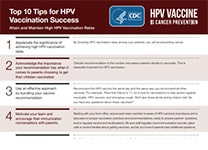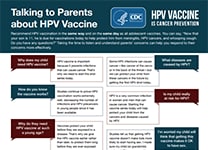Key points
- Clinicians can improve their HPV vaccination.
- This page provides resources that can help clinicians understand the HPV vaccination landscape.
- Find information on the different ways you can work with trusted partners.

Understanding HPV coverage
Learn about vaccination coverage in your area and share the data.
TeenVaxView is designed to help you access survey data collected by CDC and translate the data into action. This data can help you identify where additional efforts are needed to increase vaccination coverage.
The NIS-Teen provides national, state, and selected local area estimates of vaccination coverage among adolescents aged 13−17years living in the United States at the time of interview.
Immunization information systems (IISs) are population-based, computerized databases that record all vaccine doses administered by participating clinicians to patients within a given area. IISs can provide immunization histories and aggregate immunization data, and can guide public health action to improve vaccination rates and reduce vaccine-preventable diseases.
The Community Preventive Services Task Force recommends using IISs, which are effective in increasing vaccination rates through their capacities to:
- Create or support interventions such as reminder/recall, AFIX, and provider reminders
- Determine patient vaccination status
- Inform vaccination coverage assessments, missed vaccination opportunities, invalid dose administration, and vaccination coverage disparities
- Facilitate vaccine inventory management and accountability
Reminder/recall systems
Reminder/Recall systems are cost-effective methods to identify and notify families when children are due for vaccinations or are already behind. Reminders and recalls differ in content and can be delivered by various methods—telephone, text message, letter, postcard, or other. Most reminder and recall notices are tailored for individuals, and many are accompanied by educational messages about the importance of vaccination.
Many (EHR) systems are capable of creating reports that identify specific populations and what vaccinations they are due for. Provider staff can then contact those individuals to schedule an appointment. Studies show that reminder/recall activities are a cost-effective way to improve vaccination rates. Some state programs contact patients through mass mailings while others may have office staff call households individually to remind patients and schedule appointments.
Quality improvement projects targeting immunization
Physicians, nurses, pharmacists and other healthcare professionals are sometimes required to carry out a quality improvement project. Quality improvement projects may be required for “Maintenance of Certification,” and for some residency training programs.
The American Board of Medical Specialty lists requirements for each of its specialty members for the Maintenance of Certification Part IV Practice Performance Assessment. [4 pages]
Immunization quality improvement projects are often selected because immunization is a dynamic, critical and measurable area of healthcare. It is rapidly evolving, making fast strides in some areas but lagging in other areas, such as HPV vaccination.
CDC encourages healthcare providers to consider immunization quality improvement projects that:
- Implement measurable increases in adult immunization rates,
- Bring about measurable increases in HPV vaccination rates, particularly co-administration rates with other adolescent vaccines at the 11-12 year old visit,
- Bring about measurable increases in vaccination rates of pregnant women, specifically against influenza and pertussis, and/or
- Reduce disparities in immunization rates, whether associated with race, ethnicity, lack of insurance coverage or any other factor resulting in less-than-optimal rates.
Disclaimer: CDC does not endorse training, educational or other products of outside organizations. CDC welcomes a broad array of diverse approaches to implementing the most current recommendations of the Advisory Committee on Immunization Practice.
This website provides a comprehensive program which helps providers to implement new protocols to increase immunization rates within their practices. Resources are evidence-based and include an overview of standing order protocols. American Board of Family Medicine Maintenance of Certification Part IV is available.
MedConcert™ is a learning health system platform for patient safety, quality, and performance improvement. It provides a central platform for both individual and organizational data collection, performance measurement and real-time gap analysis across all areas of care. American Board of Internal Medicine Maintenance of Certification credit is available.
EQIPP is an online learning system for pediatricians and can provide Maintenance of Certification and CE credit. EQIPP has information, tools and guidance needed to make systematic and continuous practice improvements on several topics, including one module on immunization. Using built-in online tools, EQIPP enables you to collect, analyze, and measure data over time and make small, rapid cycles of change.
PROTECT™ (Supporting Appropriate Immunizations Across the Age Spectrum) is a multi-organizational educational initiative that consists of interconnected modules of varying learning formats, practice-oriented delivery channels, and outcomes measurement platforms. It provides effective and clinically relevant strategies to increase immunization rates for patients followed in multiple practice settings. CE credit is available.
Evidence-based tools and resources to increase vaccination
Review resources to educate providers on the burden of HPV disease, HPV vaccine as a primary HPV cancer prevention tool, and how to effectively communicate with parents using evidence-based strategies to increase vaccination.
Community Preventive Services Task Force Recommendations and Findings on Increasing Appropriate Vaccination lists interventions reviewed by the Community Guide, with a summary of the Task Force finding.
National Cancer Institute’s Division of Cancer Control and Population Sciences maintains a list of tools to understand, plan for, and implement evidence-based practices, programs, and interventions into routine health care and public health settings.
As part of the ACS HPV Roundtable the resource clearinghouse is a place where resources can be found to support the implementation of strategies to increase HPV vaccination by providing both patient and provider education tools.
An Action Guide by the American Cancer Society to implement evidence-based strategies for clinicians.
Educational resources for providers
Printable materials for providers and office staff
Posters and flyers
HPV vaccine posters are available to print and display in office waiting rooms, exam rooms, etc.




